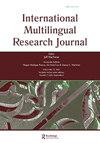A space for culturally and linguistically diverse learners?: Using S-STEP to examine world language teacher education
IF 2.1
1区 文学
Q2 EDUCATION & EDUCATIONAL RESEARCH
引用次数: 0
Abstract
ABSTRACT When considering access to broader learning opportunities beyond the core curriculum for Culturally and Linguistically Diverse Learners (CLDLs), the world language classroom is rarely a space that offers such access, despite the fact that CLDLs should have as much access to the development of multilingualism through school curricula as dominant English speakers. In this paper, three teacher educators use a reflective, dialogic method to unpack their work with preparing WL teacher candidates to work with CLDLs. This self-study of teacher education practice examines the sensemaking of 20 world language teachers in a course designed to teach them sheltered English immersion approaches to supporting CLDLs. Findings reveal that teachers had very little notion that CLDLs might take additional languages and little support was available to model excellent practice for them. Questions about whether WL courses can provide genuine spaces for multilingual development and implications for preparing WL teachers to support cultural and linguistic diversity are discussed.文化和语言多样性学习者的空间?:用S-STEP检验世界语言教师教育
当考虑到文化和语言多样性学习者(cldl)在核心课程之外获得更广泛的学习机会时,世界语言课堂很少提供这种机会,尽管事实上cldl应该通过学校课程获得与占主导地位的英语使用者一样多的多语发展机会。在本文中,三位教师教育者使用一种反思、对话的方法来解读他们的工作,为WL教师候选人准备与cldl合作。这一教师教育实践的自学考察了20位世界语言教师在一门课程中的语义表达,该课程旨在教授他们庇护的英语浸入式方法来支持cldl。调查结果显示,教师几乎没有意识到cldl可能需要额外的语言,也几乎没有为他们提供优秀实践模型的支持。本文讨论了外语课程能否为多语言发展提供真正的空间,以及培养外语教师支持文化和语言多样性的意义。
本文章由计算机程序翻译,如有差异,请以英文原文为准。
求助全文
约1分钟内获得全文
求助全文
来源期刊
CiteScore
4.10
自引率
4.80%
发文量
19
期刊介绍:
The International Multilingual Research Journal (IMRJ) invites scholarly contributions with strong interdisciplinary perspectives to understand and promote bi/multilingualism, bi/multi-literacy, and linguistic democracy. The journal’s focus is on these topics as related to languages other than English as well as dialectal variations of English. It has three thematic emphases: the intersection of language and culture, the dialectics of the local and global, and comparative models within and across contexts. IMRJ is committed to promoting equity, access, and social justice in education, and to offering accessible research and policy analyses to better inform scholars, educators, students, and policy makers. IMRJ is particularly interested in scholarship grounded in interdisciplinary frameworks that offer insights from linguistics, applied linguistics, education, globalization and immigration studies, cultural psychology, linguistic and psychological anthropology, sociolinguistics, literacy studies, post-colonial studies, critical race theory, and critical theory and pedagogy. It seeks theoretical and empirical scholarship with implications for research, policy, and practice. Submissions of research articles based on quantitative, qualitative, and mixed methods are encouraged. The journal includes book reviews and two occasional sections: Perspectives and Research Notes. Perspectives allows for informed debate and exchanges on current issues and hot topics related to bi/multilingualism, bi/multi-literacy, and linguistic democracy from research, practice, and policy perspectives. Research Notes are shorter submissions that provide updates on major research projects and trends in the field.

 求助内容:
求助内容: 应助结果提醒方式:
应助结果提醒方式:


